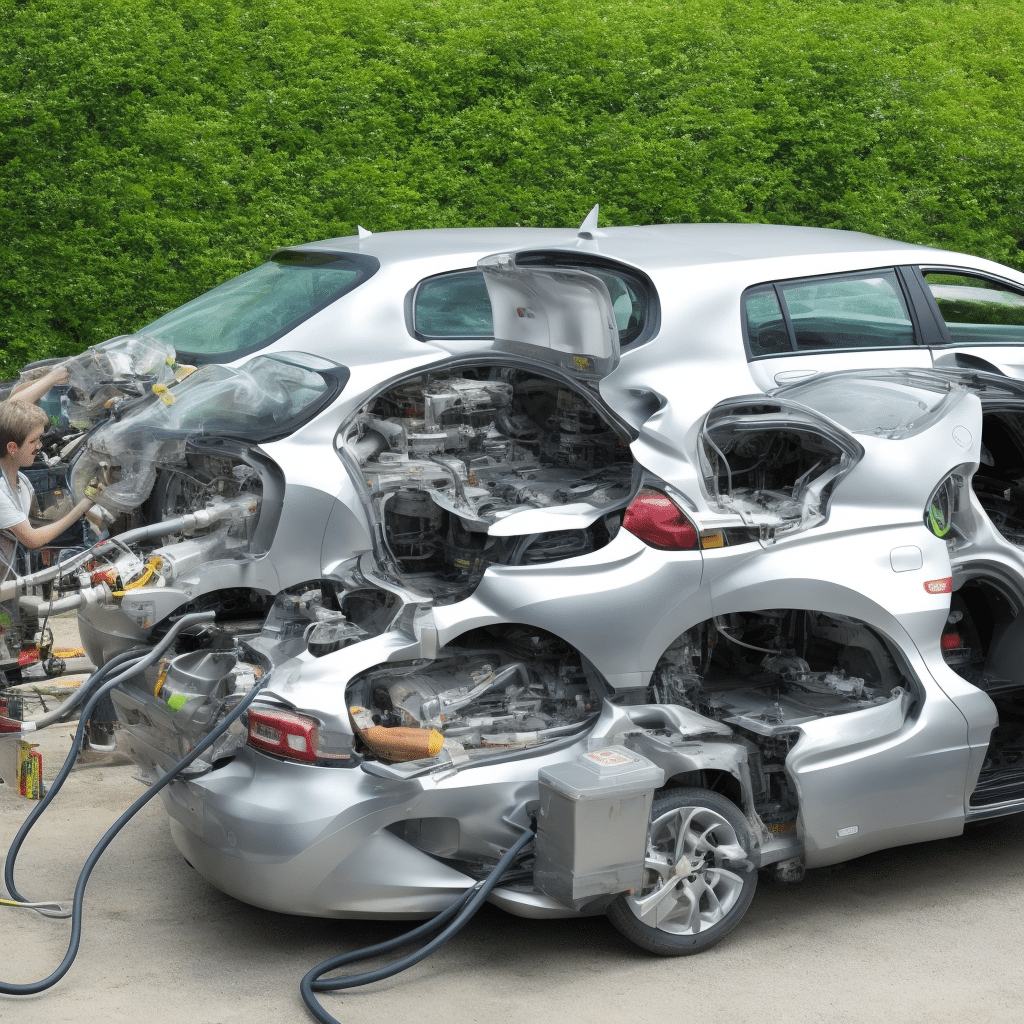As you navigate the ever-changing landscape of the 21st century, you’ve likely heard discussions about alternative fuels. With increasing concerns about climate change, the move toward renewable energy, and rising gasoline prices, more and more people are looking at their cars and wondering: could I convert my vehicle to run on alternative fuels?
This article will provide detailed information on the possibility, process, and practicality of converting cars to run on alternative fuels. We will walk you through the types of alternative fuels available, the conversion process for each, certification requirements, and the potential benefits and drawbacks of such a conversion.
A voir aussi : What’s the Best Approach to Teaching Teens Safe Driving Practices?
Understanding the Types of Alternative Fuels
Before you decide to convert your car, it’s important to understand the different types of alternative fuels on the market.
Electric
Electric cars are becoming increasingly popular as technology advances and prices decrease. These cars run on electricity, which is stored in a rechargeable battery pack.
A lire en complément : What Are the Top Features to Look for in a New SUV?
To convert a traditional gasoline-powered car to an electric vehicle, you will need to replace the internal combustion engine with an electric motor and install a large battery pack.
Hydrogen
Hydrogen fuel cell cars are another form of electric vehicle. Instead of using electricity from the grid, these cars generate electricity through a chemical reaction between hydrogen and oxygen.
Converting a car to run on hydrogen is a complex process that involves installing a hydrogen fuel cell, along with all the necessary safety and storage components.
Ethanol
Ethanol is a type of biofuel made from corn or other plant materials. Cars that run on ethanol are still pretty similar to regular gasoline-powered vehicles, but their engines are modified to handle the different fuel.
To convert a car to run on ethanol, you will need to adjust the fuel injection system and install a sensor to monitor the fuel mixture.
Natural Gas
Natural gas, like gasoline, is a fossil fuel. However, it burns cleaner than gasoline, making it a more environmentally friendly option.
To convert a vehicle to run on natural gas, you will need to install a pressurized gas tank and modify the engine to work with the new fuel.
The Conversion Process
Once you have chosen your preferred alternative fuel, the next step is to begin the conversion process.
Electric Conversion
Converting a car to an electric vehicle is a significant undertaking. You’ll need to completely remove the car’s internal combustion engine and replace it with an electric motor. You will also need to install a large battery pack to store electricity, along with chargers and controllers to manage the energy flow.
To ensure safety and performance, it’s highly recommended that you consult a professional for this conversion process.
Hydrogen Conversion
Converting a car to run on hydrogen is even more complex than an electric conversion. Not only do you need to install the hydrogen fuel cell, but you also need to take into account the safety and storage components. Hydrogen is a highly volatile gas, so it must be stored and handled correctly to prevent accidents.
This conversion is not something to take on lightly and will likely require the expertise of a professional.
Ethanol Conversion
Converting a vehicle to run on ethanol is slightly simpler. You’ll need to adjust the fuel injection system and install a sensor to monitor the fuel mixture. This can typically be done by a mechanic with experience in ethanol conversions.
Natural Gas Conversion
Just like with the other fuels, converting a car to run on natural gas involves installing a new fuel system. In this case, you’ll need a pressurized gas tank and modifications to the engine. This conversion should also be done by a professional.
Certification and Regulations
Before you set out to convert your vehicle to run on alternative fuels, it’s crucial to be aware of the certification and regulations associated with these conversions.
In the United States, for example, any conversion that involves altering the emission control system of a vehicle must be certified by the Environmental Protection Agency (EPA). This certification process ensures that the converted vehicle will still meet federal emission standards.
Furthermore, it’s important to note that as of December 2024, these regulations and certification processes may vary by state and country. Always check with local and national regulations before proceeding with a conversion.
Evaluating the Pros and Cons
As with any major decision, it’s important to weigh the potential benefits and drawbacks before proceeding with a vehicle conversion to alternative fuels.
On the plus side, alternative fuels are generally more environmentally friendly than traditional gasoline. Electric and hydrogen fuel cell vehicles produce zero tailpipe emissions, while ethanol and natural gas burn cleaner and produce fewer emissions than gasoline.
Additionally, depending on where you live and the type of alternative fuel you choose, you may also benefit from incentives like tax credits or rebates.
However, there are also several potential drawbacks to consider. The conversion process can be expensive and time-consuming, and it may also affect the vehicle’s performance or range. Plus, depending on the alternative fuel you choose, you may find that fueling stations are not as readily available as gas stations.
In conclusion, converting a car to run on alternative fuels is a possibility. However, it’s not a decision to be taken lightly. It involves careful consideration, a fair amount of work, and potentially significant up-front costs. As always, it’s best to thoroughly research and consider all your options before making a decision.
Flex Fuel Vehicles and Biodiesel Conversion
Flex fuel vehicles are another option for those considering alternative fuels. These vehicles are specifically designed to run on a mixture of gasoline and ethanol, typically E85, which is a mix of up to 85% ethanol and 15% gasoline. Flex fuel vehicles have engines and fuel systems that are designed to handle this type of fuel without any modification.
Converting a regular gasoline vehicle to a flex fuel vehicle requires modifications to the engine, fuel system, and fuel injection system. However, many newer vehicles, particularly those produced within the last decade or so, are flex fuel ready, meaning they can accept both regular gasoline and E85 without requiring any modifications.
Biodiesel, on the other hand, is an alternative fuel produced from renewable resources like vegetable oils or animal fats. Biodiesel can be used in any diesel engine with little to no modifications, making it a more convenient option for diesel vehicle owners.
The biodiesel conversion process involves replacing the vehicle’s fuel filter and possibly some of the fuel lines, depending on the model year and type of vehicle. It’s also recommended to clean the fuel tank before switching to biodiesel to remove any build-up that could potentially clog the fuel system.
Light Duty and Heavy-Duty Vehicles Conversion
Depending on the size and type of your vehicle, the conversion process and considerations can vary considerably.
For light-duty vehicles, including most passenger cars and small trucks, conversions to electric or hydrogen fuel cell power can be quite involved. These conversions require the complete removal of the internal combustion engine and the installation of an electric motor or hydrogen fuel cell, battery packs, and associated control systems.
For heavy-duty vehicles, such as buses and large trucks, conversions to natural gas or biodiesel might be more practical. Natural gas conversions require the addition of a pressurized gas tank and modifications to the engine to accommodate the new fuel, while biodiesel conversions typically involve only minor modifications to the fuel system.
The process for both light and heavy-duty vehicle conversions should be carried out by professionals to ensure safety and compliance with all relevant regulations.
Conclusion
Considering the current environmental crisis and the upward trend in gasoline prices, switching to alternative fuels seems like a promising solution. It not only offers a more sustainable way of running vehicles but also can provide significant cost savings in the long run.
However, converting a vehicle to run on alternative fuels is a significant undertaking. It involves a thorough understanding of the types of fuels available, the conversion process, and the associated costs. One also needs to consider the practicality of using alternative fuels, which can be influenced by factors such as availability of fueling stations and potential impact on vehicle performance.
Before making a decision, it’s crucial to weigh up the pros and cons, consider your driving habits, and consult professionals. It is also advisable to stay updated with the latest regulations and certifications related to alternative fuel conversions in your country or state.
Alternatives like electric vehicles, hydrogen fuel cells, ethanol, natural gas, and biodiesel open up new possibilities for reducing our carbon footprint and moving towards a more sustainable future. While the journey towards alternative fuels may be challenging, it certainly holds great potential for both individuals and the environment.
Remember, the shift towards alternative fuels is not just about individual decisions but a collective movement towards a cleaner, more sustainable world. Each step we take in this direction brings us closer to achieving this goal.






